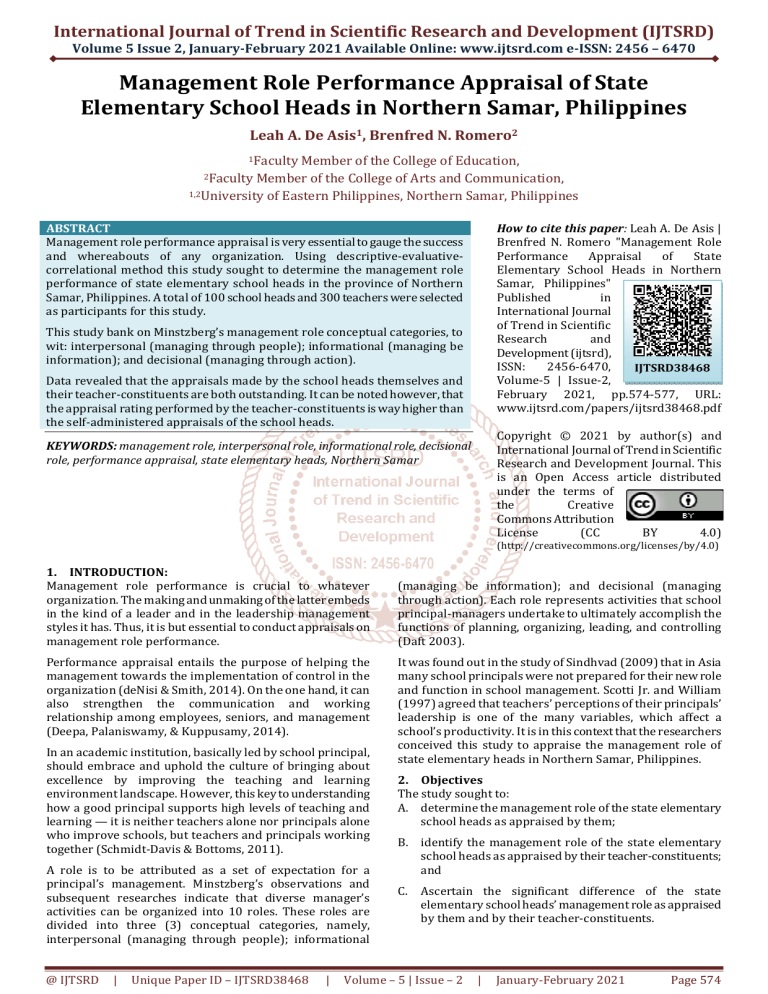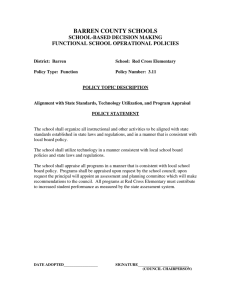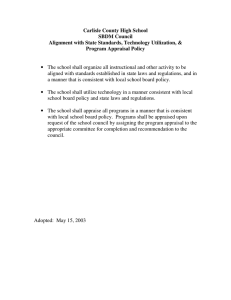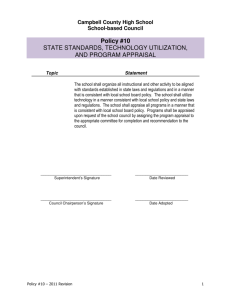
International Journal of Trend in Scientific Research and Development (IJTSRD)
Volume 5 Issue 2, January-February 2021 Available Online: www.ijtsrd.com e-ISSN: 2456 – 6470
Management Role Performance Appraisal of State
Elementary School Heads in Northern Samar, Philippines
Leah A. De Asis1, Brenfred N. Romero2
1Faculty
Member of the College of Education,
2Faculty Member of the College of Arts and Communication,
1,2University of Eastern Philippines, Northern Samar, Philippines
ABSTRACT
Management role performance appraisal is very essential to gauge the success
and whereabouts of any organization. Using descriptive-evaluativecorrelational method this study sought to determine the management role
performance of state elementary school heads in the province of Northern
Samar, Philippines. A total of 100 school heads and 300 teachers were selected
as participants for this study.
How to cite this paper: Leah A. De Asis |
Brenfred N. Romero "Management Role
Performance
Appraisal
of
State
Elementary School Heads in Northern
Samar, Philippines"
Published
in
International Journal
of Trend in Scientific
Research
and
Development (ijtsrd),
ISSN:
2456-6470,
IJTSRD38468
Volume-5 | Issue-2,
February 2021, pp.574-577, URL:
www.ijtsrd.com/papers/ijtsrd38468.pdf
This study bank on Minstzberg’s management role conceptual categories, to
wit: interpersonal (managing through people); informational (managing be
information); and decisional (managing through action).
Data revealed that the appraisals made by the school heads themselves and
their teacher-constituents are both outstanding. It can be noted however, that
the appraisal rating performed by the teacher-constituents is way higher than
the self-administered appraisals of the school heads.
Copyright © 2021 by author(s) and
International Journal of Trend in Scientific
Research and Development Journal. This
is an Open Access article distributed
under the terms of
the
Creative
Commons Attribution
License
(CC
BY
4.0)
KEYWORDS: management role, interpersonal role, informational role, decisional
role, performance appraisal, state elementary heads, Northern Samar
(http://creativecommons.org/licenses/by/4.0)
1. INTRODUCTION:
Management role performance is crucial to whatever
organization. The making and unmaking of the latter embeds
in the kind of a leader and in the leadership management
styles it has. Thus, it is but essential to conduct appraisals on
management role performance.
Performance appraisal entails the purpose of helping the
management towards the implementation of control in the
organization (deNisi & Smith, 2014). On the one hand, it can
also strengthen the communication and working
relationship among employees, seniors, and management
(Deepa, Palaniswamy, & Kuppusamy, 2014).
In an academic institution, basically led by school principal,
should embrace and uphold the culture of bringing about
excellence by improving the teaching and learning
environment landscape. However, this key to understanding
how a good principal supports high levels of teaching and
learning — it is neither teachers alone nor principals alone
who improve schools, but teachers and principals working
together (Schmidt-Davis & Bottoms, 2011).
A role is to be attributed as a set of expectation for a
principal’s management. Minstzberg’s observations and
subsequent researches indicate that diverse manager’s
activities can be organized into 10 roles. These roles are
divided into three (3) conceptual categories, namely,
interpersonal (managing through people); informational
@ IJTSRD
|
Unique Paper ID – IJTSRD38468
|
(managing be information); and decisional (managing
through action). Each role represents activities that school
principal-managers undertake to ultimately accomplish the
functions of planning, organizing, leading, and controlling
(Daft 2003).
It was found out in the study of Sindhvad (2009) that in Asia
many school principals were not prepared for their new role
and function in school management. Scotti Jr. and William
(1997) agreed that teachers’ perceptions of their principals’
leadership is one of the many variables, which affect a
school’s productivity. It is in this context that the researchers
conceived this study to appraise the management role of
state elementary heads in Northern Samar, Philippines.
2. Objectives
The study sought to:
A. determine the management role of the state elementary
school heads as appraised by them;
B. identify the management role of the state elementary
school heads as appraised by their teacher-constituents;
and
C.
Ascertain the significant difference of the state
elementary school heads’ management role as appraised
by them and by their teacher-constituents.
Volume – 5 | Issue – 2
|
January-February 2021
Page 574
International Journal of Trend in Scientific Research and Development (IJTSRD) @ www.ijtsrd.com eISSN: 2456-6470
3. Review of Literature
Like any other organization, state elementary schools need
an administrator with effective leadership manifested
through outstanding management. Leadership is all about
organizational improvement; more specifically, it is about
establishing agreed-upon and worthwhile directions for the
organization in question, and doing whatever it takes to prod
and support people to move in those directions (Louis et al,
2010).
Johnson (2006) agreed and viewed the principal as the
broker of workplace conditions — someone whose influence
on the school as a workplace for teachers extends well
beyond being in charge of the school.
In a successful school management, an effective school
principal is seen to have: a shared vision for what the school
can be and communicate the vision regularly with the
educators; strong interpersonal skills and place a high value
on people as both assets and resources; uniting power rather
than dividing; problem-solving skills and as an avid learner,
should always seek answers and solutions; confidence that
he/she can make a difference for educators; a focused
emphasis on instruction, development, and enablement of
his/her educators, and a deep passion to achieve and
improve the work environment of his/her educators
(Wenceslao, A., Misa, J., & Tugonon, T., 2018).
A skilled and well-supported leadership team in schools can
help foster a sense of ownership and purpose in the way that
teachers approach their job. Conferring professional
autonomy to teachers will enhance the attractiveness of the
profession as a career choice and will improve the quality of
the classroom teaching practice (OECD, 2002, p. 14).
Organizational improvement in schools lies in the kind/type
of administrator they have. Conducting appraisal on
management role performance is deemed essential.
Buckingham and Goodall (2015) highlighted that
performance appraisal provides clarity of role to employees
for the responsibilities and expectations of the workplace.
4. Methodology
This academic inquiry employed descriptive-evaluativecorrelational method. Research participants were composed
of 100 selected state elementary school heads in Northern
Samar, Philippines and 300 teacher-constituents.
Interview-questionnaire was used as the main data
gathering tool.
5. Results and Discussion
Table 1: Management Role Performance of State
Elementary School Heads as Appraised by Them
Management Role
Weighted
Interpretation
Performance
Mean
Interpersonal Roles
4.23
Outstanding
Informational Roles
4.24
Outstanding
Decisional Roles
4.05
Outstanding
Total Weighted Mean
4.17
Outstanding
Table 1 indicates that with a total weighted mean of 4.17, the
management role performance of state elementary school
heads in Northern Samar, Philippines, as appraised by them,
is outstanding. This data finds support from the study of
Wenceslao, A., Misa, J., & Tugonon, T. (2018) conducted
among school administrators in Ormoc City District IV, Leyte,
Philippines.
@ IJTSRD
|
Unique Paper ID – IJTSRD38468
|
The table further shows that the state elementary school
heads’ informational roles (4.24) accumulated the highest
appraisal. Thus, it can be deduced that they bank on reading
professional journals and research reports for updates in
teaching and learning practices and processes; update
teachers by sharing with them timely and highly significant
information; and maintain personal contact with the staff,
teachers, parents, and the community.
The data on interpersonal roles (4.23) suggests that they
represent the school in sessions and both internal and
external programs and activities; sign documents, and other
pertinent legal papers; and always cordially welcome school
visitors and representatives from higher offices.
Lastly, decisional roles (4.05). This goes to show that they
initiate activities to renovate/improve classroom facilities
and equipment to maintain school climate conducive for
effective teaching and learning environment; very open to
suggestions for the improvement of the latter; and embrace
the practice of delegating officials on their absence.
Table 2: Management Role Performance of State
Elementary School Heads as Appraised by their
Teacher-Constituents
Management Role
Weighted
Interpretation
Performance
Mean
Interpersonal Roles
4.46
Outstanding
Informational Roles
4.31
Outstanding
Decisional Roles
4.34
Outstanding
Total Weighted Mean
4.37
Outstanding
It is vividly shown in Table 2 that the over-all appraisal of
the teacher-constituents on their respective state elementary
school heads in Northern Samar, Philippines is outstanding
(4.37).
The table further denotes that it is the interpersonal roles
(4.46) of the state elementary school heads which has gained
the highest appraisal. It can be gleaned from the data that the
school heads exercise their authority to present and/or
bring over the problems, concerns, and issues of their
respective schools to higher Department of Education offices
or any town officials; always treat their subordinates with
courtesy and utmost respect; and provide avenues for
professional growth by allowing the teacher-constituents to
attend in-service training, seminars, workshops, and other
trainings sponsored by other agencies. The study of Nadeem,
Arif, and Naeem (2020) that the chief outcome of
Performance Appraisal of School (PAS) would be a
comprehensive plan of teachers’ professional development
at the district level. Most of the principals stated that their
teachers need training for innovative teaching methods,
especially for lesson planning and assessment.
Next to interpersonal roles – the decisional roles (4.34). It
can be inferred that the school heads can resolve conflicts
among their constituent-teachers and other members of the
educational community; provide precautionary measures to
protect the pupils, teachers, and the entirety of the school;
and, vouch to involve teachers in preparing the school in
case of calamities and disasters.
Ultimately, the informational roles (4.31). The data suggests
that the school heads relay information from memos, orders,
letters, and reports as guidelines for teachers on time;
regularly call assembly meetings with the parents and the
teachers to disseminate important information and
Volume – 5 | Issue – 2
|
January-February 2021
Page 575
International Journal of Trend in Scientific Research and Development (IJTSRD) @ www.ijtsrd.com eISSN: 2456-6470
collectively discuss matters pertaining to the school and the
community; and deliberately maintain an open
communication with the pupils, teachers, parents, and other
stakeholders. The study of Cruz, Villena, Navarro, Belecina &
Garvida (2016) strongly considers establishing rapport with
parents and guardians of learners as a very important
component in school-community relations.
Table 3: Significant Difference in the Assessment of the principals and Teachers on the Principals’ Management
Roles Performance
Management Role Performance t-stat t-critical Mean P-Value Interpretation Principals Teachers
Interpersonal Roles
-4.99
1.98
0.00
S
4.23
4.46
Informational Roles
-2.21
1.97
0.03
S
4.24
4.31
Decisional Roles
-5.80
1.97
0.00
S
4.05
4.34
Over-all Appraisal
-7.44
1.96
0.00
S
4.19
4.37
Table 3 deduces that the t-stat values of interpersonal roles (-4.99); informational roles (-2.21); decisional roles (-5.80); and
the over-all management roles performance (-7.44) had their respective P-value lesser than .05 indicating that there was a
significant difference in the assessment of the management roles performance of the principals as assessed by themselves and
their teachers. As shown further in the table, the assessment of the teachers on the issues was higher than the assessment of
the principals themselves. This denotes that teachers have felt or have seen that their principals performed higher in their
management tasks.
6. Conclusions
This study sought to determine the management role
performance of state elementary school heads in the
province of Northern Samar, Philippines. Data revealed that
as appraised by the school heads themselves, their
management role performance is outstanding. The appraisal
of their teacher-constituents on their management role
performance is also outstanding. It can be noted however,
that although both appraisals turned out outstanding, the
appraisal rating performed by the teacher-constituents is
way higher than the self-administered appraisals of the
school heads.
7. Recommendations
On the basis of the highlights of the study, the hereunder
recommendations are set forth.
1.
The school heads should uphold their management role
performance and should continue to venture on
boosting the morale of their teacher-constituents by
recognizing their efforts, milestones, and contributions.
They have to work well, more especially on their
decisional roles to better equate with their
interpersonal and informational roles.
2.
Teachers should continue to appraise the management
role performance of their respective school heads. They
need to extend support on the leadership needs of the
latter.
3.
Replicate the study with wider setting and broader
scope.
References
[1] Acker, R (2006). Organization and Management.
Review of Educational Research.
[2]
[3]
[4]
Buckingham, M., & Goodall, A. (2015). Reinventing
performance management. Harvard Business Review,
93(4), 40-50.
Cruz, C. D. P., Villena, D. K., Navarro, E. V., Belecina, R.
R. & Garvida, M. D. (2016). Towards Enhancing the
Managerial Performance of School Heads.
International Review of Management and Business
Research, ISSN: 2306-9007 Volume 5 Issue 2. June
Daft, R. L. (2003). Management. Sixth Edition, Ohio:
South-Western Thomson Learning.
@ IJTSRD
|
Unique Paper ID – IJTSRD38468
|
[5]
de Asis, M. P. (2020). "Accountability Performance of
Public Elementary School Principals in the Division of
Northern Samar, Philippines". Published in
International Journal of Trend in Scientific Research
and Development (IJTSRD), ISSN: 2456-6470, Volume5 | Issue-1, December, pp.771-777, URL:
www.ijtsrd.com/papers/ijtsrd38090.pdf
[6]
Deepa, E., Palaniswamy, R., & Kuppusamy, S. (2014).
Effect of performance appraisal system in
organizational commitment, job satisfaction and
productivity. Journal of Contemporary Management
Research, 8(1), 72-81.
[7]
deNisi, A., & Smith, C. E. (2014). Performance
appraisal, performance management, and firm-level
performance: A review, a proposed model, and new
directions for future research. The Academy of
Management Annals, 8(1), 127-179.
[8]
Johnson, S. M. (2006). The workplace matters:
Teacher quality, retention, and effectiveness.
Retrieved from National Education Association
website:
www.nea.org/assets/docs/HE/mf_wcreport.pdf
[9]
Louis, K. S., Leithwood, K., Wahlstrom, K., & Anderson,
S. (2010). Investigating the links to improved student
learning: Final report of research findings. Retrieved
from
Wallace
Foundation
website:
www.wallacefoundation.org/knowledgecenter/schoolleadership/keyresearch/Documents/Investigating-the-Links-toImproved-Student-Learning.pdf
[10]
Mintzberg, Henry (1989). From Mintzberg on
Management. Free Press, Simon and Schuster, Inc.
[11]
Nadeem, M., Arif, S., & Naeem. (2020). the Role of
Principals and Administrators in Performance
Appraisal of School Teachers in Punjab. Sir Syed
Journal of Education & Social Research Vol. 3, Issue 2
(April – June).
[12]
National Association of Secondary School Principals
and National Association of Elementary School
Principals (2013). Leadership Matters. What the
Research Says About the Importance of Principal
Leadership. Virginia, United States of America.
Volume – 5 | Issue – 2
|
January-February 2021
Page 576
International Journal of Trend in Scientific Research and Development (IJTSRD) @ www.ijtsrd.com eISSN: 2456-6470
[13]
OECD, (2002). Attracting, developing and retaining
effective teachers: Design and implementation plan
for the activity. Paris: OECD.
[14]
Schmidt-Davis, J., & Bottoms, G. (2011). Who’s next?
Let’s stop gambling on school performance and plan for
principal succession. Retrieved from Southern
Regional Education Board website: http://
publications.sreb.org/2011/11V19_Principal_Success
ion_Planning.pdf
[15]
Scotti, Jr. and William, H. (1987). Analysis of
organizational incongruity using teachers’ perceptions
@ IJTSRD
|
Unique Paper ID – IJTSRD38468
|
of the principals’ leadership behavior, Education,
108(1), pp: 27-33.
[16]
Sindhvad, S. (2009).School principals as instructional
leaders: An investigation of school leader capacity in
the Philippines. Doctoral Dissertation. University of
Minnesota.
Retrieved
from
http://conservancy.umn.edu/bitstream/56986
[17]
Wenceslao, A., Misa, J., & Tugonon, T. (2018).
Leadership Capabilities, Management Competence and
Performance of Elementary Public Administrators.
International Journal of Innovation and Research in
Educational Sciences Volume 5, Issue 3, ISSN
Volume – 5 | Issue – 2
|
January-February 2021
Page 577




